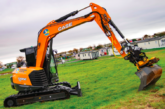Through careful daily inspections and maintenance, wheel loader operators can boost the uptime, productivity and service life of their machine.
1. Complete daily pre-start checks
Before use, a thorough check of the machine and the ground it has been parked on will reveal if any damage has occurred or if any vital fluid has leaked. This will also give the operator the opportunity to check tire pressure before further wear occurs, leading to fewer tire changes.
Checks such as fan belt wear and tension, cleanliness of the air filtration system, engine oil, grease, and coolant level can also prevent serious damage occurring and parts being replaced in the future. The easily serviceable nature of Volvo wheel loaders means that addressing smaller issues sooner rather than later is simple and affordable. By limiting further damage to the machine, operators can eliminate the need for replacement parts and prolong the uptime of their current model.
2. Warm up the machine
Start the engine and leave it running at low idling for five minutes (10 minutes at below -15ºC. Turn the mode selector switch to working mode (W) and increase the speed to approximately 1200 rpm. Run the bucket cylinders piston rod to the outer end position and at the same time, run the dipper arm out and in. Check on the display unit if the bar graph for the oil temperature is green.
3. Operate carefully
Constant monitoring of bucket capacity while operating the machinery reduces the risk of tire spinning (which will cause new tires to be necessary), slower cycle times and slower production rates. Additionally, attendance to equipment and gauges will allow the operator to pre-empt further disruptions to work.
4. Establish a cool-down routine
A comprehensive cool-down routine will also aid the long term function of Volvo wheel loaders, guaranteeing their use for future projects and limiting environmental impact. Operators should always ensure that the machine is parked on level ground with a lowered bucket and the parking brake is applied to preserve tire traction.
While the engine is idle, to allow for the turbo charger to cool, operators should record the current machine hours against the machine hours taken at the beginning of the work day. By doing this the operator ensures the machine is brought in for a service on time, rather than when serious problems occur. The duel and DEF tank should be kept full to minimise condensation and prevent issues arising that may lead to replacements. Operators should hose down the outside of the machine to preserve the paint and prevent any corrosive materials from compromising the body.
While well-trained operators are crucial to ensuring daily upkeep of the machine, Volvo CE and its network of dealers also play their part. Volvo wheel loaders are designed with ease of service in mind to guarantee minimal downtime and Volvo CE provides services that allow owners and operators to get the most out of their machines. Volvo ACTIVE CARE, for example, the 24/7/365 active machine monitoring and reporting service, can help identify and diagnose any potential issues in real-time, before they grow into a larger issue.









